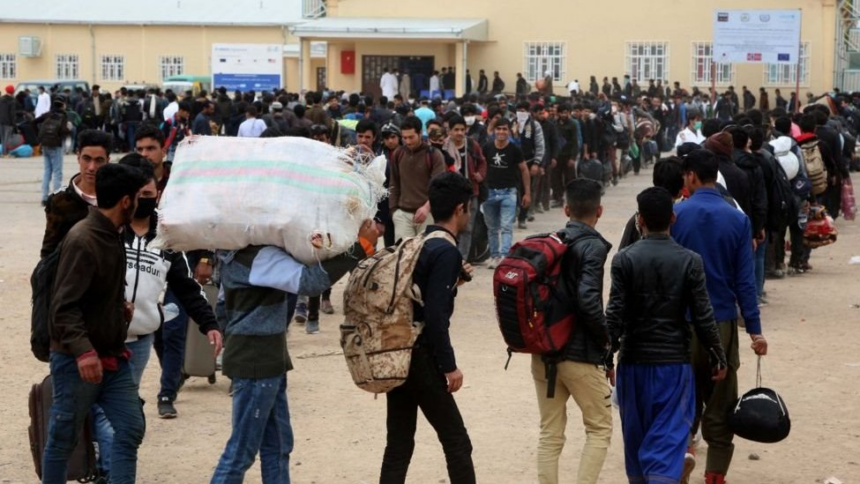RASC News Agency: The Taliban’s so-called Supreme Commission for Migrants reported that within the last 24 hours, Iranian authorities forcibly expelled 6,018 Afghanistani migrants through the Islam Qala and Pul-e-Esmail Khan border crossings. Concurrently, Pakistan returned approximately 450 additional migrants either forcibly or under coercive “voluntary” terms via the Torkham, Bahramcha, and Spin Boldak border points. According to a report published on Monday, August 4, by Bakhtar News Agency, which is controlled by the Taliban, official statistics claim that over the past week, Iran has expelled at least 85,312 Afghanistanis, while Pakistan has forcibly returned 3,189. Taliban officials overseeing migration affairs disclosed to Bakhtar that on average, more than 10,000 migrants cross into Afghanistan daily from neighboring states.
Furthermore, Taliban authorities at the Ministry of Migrants and Returnees declared in their recent annual session that around 1.8 million Afghanistani migrants have returned from Iran over the past three months, with an additional 1.2 million arriving from Pakistan since September 2023. Official data asserts that more than 80 percent of these returns were forced expulsions. This unprecedented wave of mass deportations has thrust Afghanistan into a dire humanitarian emergency. Countless returnees report harrowing accounts of physical abuse, confiscation of possessions, and other forms of inhumane treatment along the routes of forced repatriation. Despite the growing scale of this tragedy, the Taliban regime has failed to design or implement any meaningful plan to provide shelter, support, or reintegration services for the millions cast back into a country stripped of resources and stability.
Alarming reports from local sources and the United Nations Assistance Mission in Afghanistan (UNAMA) indicate that Taliban intelligence operatives are active at border crossings and within the returning migrant populations. They conduct intrusive searches targeting former military personnel and political dissidents, spreading fear and insecurity among already traumatized deportees and their families. Experts warn that this relentless policy of forced expulsion risks triggering a complex humanitarian and security crisis in Afghanistan. Beyond the immediate consequences of widespread poverty and displacement, these actions deepen social fractures, foment mistrust, and exacerbate psychological trauma among returnees. Such dynamics threaten to further destabilize a nation already teetering on the brink of collapse.
The Taliban’s catastrophic mismanagement of this migrant crisis, coupled with their blatant disregard for basic human rights and international norms, starkly exposes their failure as de facto rulers of Afghanistan. By treating their country as a dumping ground for unwanted migrants without any plan for sustainable solutions, they perpetuate suffering and undermine regional stability. In the face of this escalating catastrophe, the international community must urgently step in to provide humanitarian relief and hold the Taliban accountable for their gross negligence and complicity in deepening the crisis. The fate of millions of Afghanistani returnees hangs precariously in the balance, demanding immediate and decisive action.






